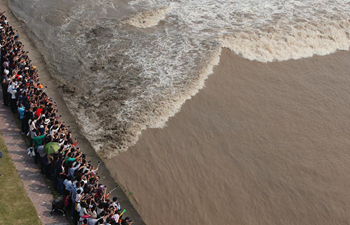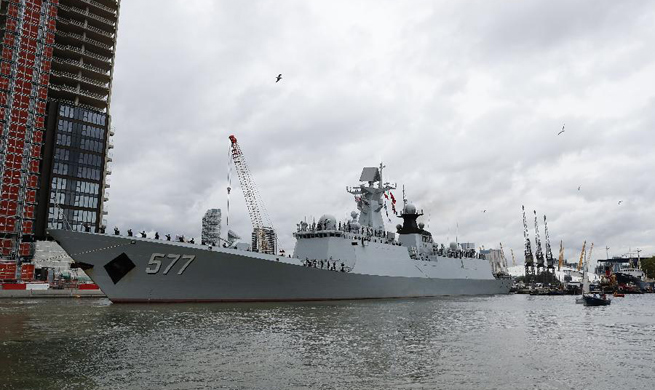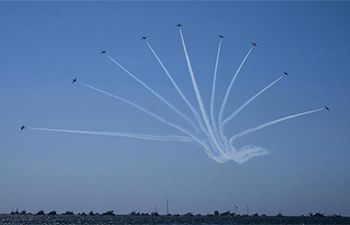TRIPOLI, Oct. 8 (Xinhua) -- The western Libyan city of Sabratha is gradually recovering from a three-week fierce fighting, after the anti-IS operation room took over the city two days ago.
The center of Sabratha bared the marks of large military actions. Munitions and war debris are scattered, and a large number of houses, government buildings and banks are largely damaged. Increasing number of residents are returning to their homes with a heavy presence of military and police forces on the streets.
"Sabratha witnessed three weeks of fighting, in which armed militias used ammunition and heavy weapons, destroyed the city's vital center, and displaced residents. They did not take into account the sanctity of homes or private and government interests," Saleh Gresi'a, the head of the information office of the anti-IS operation chamber, told Xinhua.
"The chamber and the supporting forces managed to defeat the criminal gangs that used to carry out human trafficking and smuggling of fuel, as well as acts of barbarism and kidnapping of citizens," Gresi'a said.
Gresi'a pointed out that the city is gradually recovering. "We are waiting for the completion of the scanning operations by the military engineering teams, which are working to remove all remnants of war and booby traps scattered in some private and government properties."
The ruins of Sabratha, which dates back to the Roman times, were also damaged by the fighting. The facade and walls of the Roman theater were hit.
"The damage is relatively limited, but the Roman theater is the most damaged site, as we detected a number of bullets in the facade of the theater," said Mohamed Abu-Ajela, Sabratha monuments control officer, told Xinhua, confirming that no major damaged was detected on the archaeological site.
"I have been in contact with the antiquities authority, through which the United Nations was informed of the size of the damage. Some international archaeological institutes will do some restoration to the monuments and help us rebuild according to a comprehensive plan," Abu-Ajela said.
The UNESCO called for cease-fire and not targeting archaeological sites last week when the fighting was still going on according to the Hague Convention of 1954 on the protection of cultural property in the event of armed conflict.
The organization expressed concern about the escalating military action around the ruins of Sabratha, stressing the need to protect the Libyan cultural heritage in times of conflict, as urged by the United Nations Security Council.
The Roman ruins of Sabratha are among the five Libyan sites listed on the UNESCO World Heritage since 1982.
"The monuments are global cultural heritage. In the past, they have not been damaged, but those criminal groups do not see any value to these sites. They stationed around them and deployed snipers on the walls, with the aim of causing losses in our ranks and to convince the public that the operation room is responsible for the destruction of the monuments." Omar Abdul-Jalil, commander of the anti-IS operation room, told Xinhua.
"I issued strict orders to all military personnel not to use military force at the monuments. We were professionally able to spare the site destruction." Abdul-Jalil said, holding the "criminal gangs" responsible for the damage to the archaeological sites.
Abdul-Jalil imposed a curfew in Sabratha, until the security situation in the city is stabilized. "We have imposed a curfew within the city from 10 p.m. until 6 a.m. until security is restored in Sabratha, for fear that criminal gangs might take advantage of the situation to attempt to infiltrate and cause security breaches inside the city." he said.
The anti-IS operation room took over Sabratha, some 70 km west the capital Tripoli, after three weeks of violent clashes that erupted on Sept. 17 against the rival Anas Al-Dabbashi battalion and the 48th Infantry Battalion affiliated with the city's military council. The fighting killed more than 35 and injured more than 200, according to medical reports.
The operation room accused the two militias of smuggling and immigrant trafficking through the Mediterranean, as well as kidnapping of businessmen for ransom and torturing of migrants.
Sabratha is one the largest illegal smuggling destinations in Libya. Smugglers send thousands of migrants in rickety boats towards Europe, many of whom drown halfway.

















